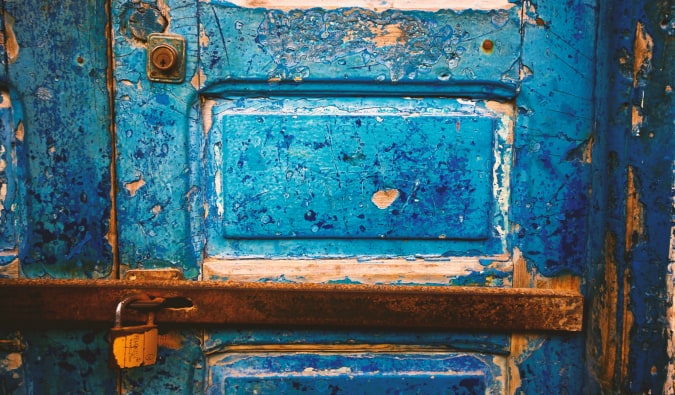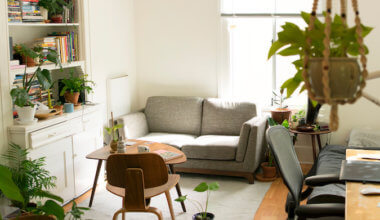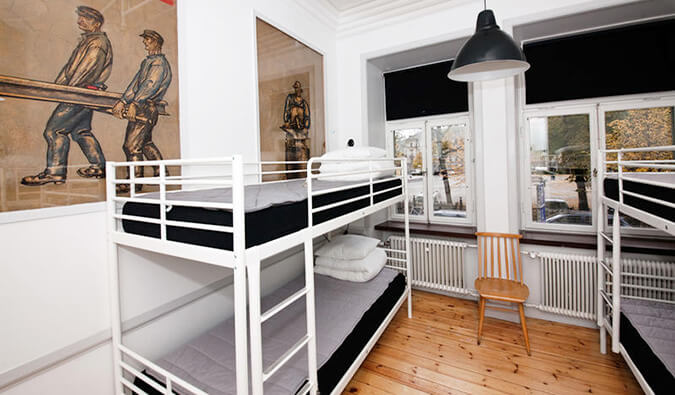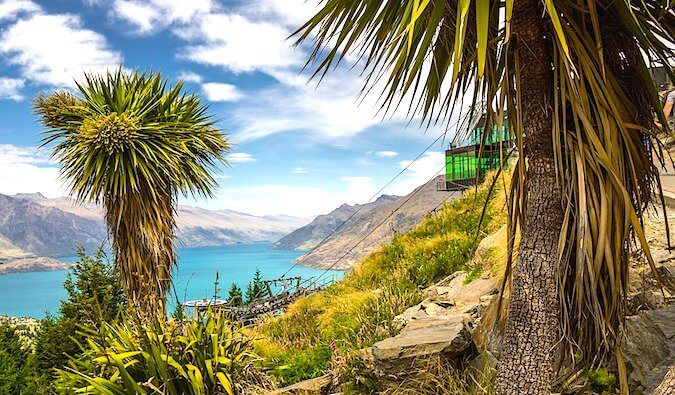
Last Updated: 10/31/22 | October 31st, 2022
I used to hate renting apartments from websites like Airbnb. As a solo traveler, I preferred the social atmosphere of hostels. You got to meet people, they ran activities, hosted events, and were where you were “supposed to stay” as a backpacker.
When I did want something other than a hostel, I used a hospitality network liked Couchsurfing or simply stayed with friends.
But, after a decade of life as a nomad, there are times when I like my privacy (and sometimes I also need extra space for work). While I may not use apartment rentals all the time, I stay in them often. I’ve found that they provide good value (especially if you’re traveling with multiple people), privacy, space, and a great home-like environment.
While Airbnb is not as good as it used to be (and while it does contribute to overtourism), there are still lots of great hosts on the platform who provide budget-friendly accommodation to travelers looking for an alternative to hostels that won’t break the bank.
After using apartment rentals regularly for years, I wanted to create a detailed guide about how they work, how to pick the perfect apartment, and how to not get cheated.
How Do Apartment Rentals Work?
Apartment rental sites allow locals to rent out an individual room, shared space (such as a couch in a living room), or entire home/apartment. The host lists their place online, posts photos, writes a description, hit publish, and, presto, they can start to make extra money with the unused space.
The booking process is like booking any other type of accommodation online. You search the database, find a place you like, create an account, and request a booking. When the owner accepts, you are sent a confirmation.
Additionally, many websites allow owners to list their place with an instant booking option, which means you don’t even have to wait for the owner to reply. You’re instantly booked in your accommodation (similar to when you book a hotel).
You’ll also be able to read reviews about the host and the apartment and see exactly what amenities are included. For example, you can see if there is a kitchen (so you can cook your own meals to save money) or if there are restrictions on noise, smoking, and pets. Maybe you need access to a washer and dryer or fast Wi-Fi. You can find all of that out in the host’s profile (or in the reviews).
Most accommodation rental sites also include a map so you can see where you’ll be located. That way, you can pick an apartment close to the attractions you want to visit, or, choose one further afield so you can have a quieter stay and get a feel for local life beyond the tourist crowds.
Who is this for?
Apartment rentals represent the space between hostels and hotels. If you are traveling on business and want the comforts of home, you probably aren’t going to stay in a hostel. But hotels may be too expensive or too impersonal for you. A rented apartment is a perfect compromise.
Or maybe, like me, you love the hostel scene but occasionally need more space and privacy. An apartment rental will be a lot quieter and more relaxing than a hostel since you won’t need to be around as many people (or as much noise). You’ll also be able to cook your own food, helping keep costs down on your trip.
Traveling with friends or a big group? This is definitely the option for you. Squeezing a bunch of people into a rental home/apartment will be much cheaper per person than a room in a hostel or hotel. Plus, you get space to spread out and relax. Dorm rooms and cramped hotels don’t give you a lot of “me” time.
Additionally, if you choose a “shared accommodation” option (which usually means sleeping in someone’s living room or other semi-private space), you can often find prices for even less than a hostel. While you won’t have much privacy, this is a good budget-friendly choice for travelers who just need a cheap place to crash.
You’ll also get to interact with your host, who can provide lots of insider tips and insight to your destination.
How to Pick the Right Airbnb
Unfortunately, as accommodation rentals have exploded into the mainstream, it’s become harder and harder to find great hosts. A lot of hosts now own multiple properties and live elsewhere. That means you often deal with property managers and never get to interact with the actual owner.
Additionally, a lot of apartments aren’t quite as nice in reality as they appear in the photos (my team had to get a refund on an apartment in Boston because it was dirty and falling apart).
In order to find suitable accommodation, I use the same criteria for sites like Airbnb as I do for Couchsurfing. This lets me weed out bad listings. Here is what to keep in mind when looking for a host:
- Do they have positive reviews? – If other people stayed there, had a good time, and found the apartment as advertised, you probably will too.
- Do they have multiple listings? – This is important because many people use these sites to be property managers. They buy a bunch of apartments and then re-rent them on Airbnb. I try to avoid these places because they are usually not as nice as other apartments and lack the personal touch that comes when hosts rent out their own apartments.
- Do they have accurate photos? – Any listing that doesn’t include a lot of (quality) photos is probably hiding something (or at the very least misrepresenting the accommodation).
- Do they have verified photographs? – Having verified photos means someone has been there, seen the place, and vouched that it actually looks like its photos.
- Are they an active user or Superhost? – Active users are good users, so see when they last logged on. If it’s been a while, your query might go unanswered.
- Is their calendar updated? – While listings only show up in a search if they are available, hosts don’t always update their calendar. If someone hasn’t updated their calendar in 30 days, I tend to skip it. There’s nothing worse than going to book a place, only for them to cancel and say, “Whoops, sorry, it’s not available!”
- Do they reply often? – You don’t want your inquiry to go unanswered. These sites show the percentage of messages hosts reply to. The higher the better.
- Are they verified? – Verified accounts are less likely to be people of suspicious quality, as the listing site has at least found some background information on them.
- Have they been someone else’s guest before? – If they were someone’s guest and that went well, it’s likely that they will be reliable.
These nine rules are helpful guidelines, but at the end of the day, you have to go with your gut. I don’t need a listing to meet all nine points. I once had a host who hit only a couple of these points and she turned out to be my favorite host! And sometimes, in places without many hosts, you might have to be a little loose with this list.
But the more points a place meets, the safer I feel.
A Note on Gentrification/Legal Issues
Over the years, Airbnb and other apartment rental websites have dramatically raised the price of rents and pushed out the locals you want to interact with as people have started to buy multiple properties in order to rent them out to tourists. It’s a big problem.
In many places like Lisbon and Venice, most locals can’t afford the price of rent anymore.
There have been strong protests against Airbnb (and similar sites)in Barcelona. Japan cracked down on Airbnb. NYC has strict laws against it.
I believe the government can’t tell you what to do with your place — but I also don’t think these websites have done enough to ensure that you are renting from actual people and not property owners who are buying multiple dwellings and forcing the locals out.
I strongly encourage you to only use Airbnb if you are renting a room in someone’s house. It’s too hard to determine if that entire home you’re renting is really someone’s private residence or a rental property owned by a giant company. If it’s a room, you know it’s a local’s place. If you do want to rent an entire apartment, make sure it’s someone’s real place — not a corporation.
Help end overtourism. You have the power. Don’t displace the people you want to visit!
Are These Sites Safe?
These sites run on trust. All these companies try to verify both buyer and seller to ensure no one ends up robbing anyone else, but you sometimes hear reports of sex parties, robberies, or creepy hosts.
However, apartment rental companies do provide a window that allows you to get your money back if you get a place that’s not as advertised. Just call their 24-hour hotline and they will set you up somewhere else (you can also reach out on social media to get the conversation started). They also hold your money in escrow so that if the place isn’t as advertised, you’ll get your money back. You never hand it over directly to the host.
All types of accommodations have risks (cleaners can steal from hotel rooms, dorm mates can take clothes from hostels, Couchsurfing hosts can get creepy), which is why these rules are important. I don’t think apartment rentals are any less safe than your other options, and the benefits greatly outweigh the perceived danger.
Moreover, hosts rely on reviews much more so than traditional accommodation. That means, as a guest, you have a lot of power should there be a problem.
The Best Sites to Find a Rental Apartment
While Airbnb reigns supreme, there are actually several websites you can use to find rental accommodation while you travel:
- Airbnb
- House Trip
- Vrbo
- Campspace (for finding private campsites)
Another option for long-term travelers is house sitting and pet sitting. In exchange for looking after someone’s property or pet while they travel, you get access to free accommodation. It’s a great option for slow/long-term travelers looking to stay in one location for longer periods of time. Check out this post to learn more about it!
If I’m traveling by myself, I tend to stay in a hostel dorm or use hotel points, but I use Airbnb pretty much every time I travel with friends.
And many of the hosts have really made a difference. There was the host in Curaçao who picked me up from the airport (and drove me around the island), the host in Galway who took me out for drinks (he turned out to be a reader!), and the French hosts who left me a cute hand-drawn map and a bottle of wine. You won’t find such personal service at hotels.
Apartment rentals, when done right, are safe, affordable, and help you have a more authentic experience. Use the tips above and try one on your next trip. You’ll save money, get away from the tourists, and have a better trip!
Book Your Trip: Logistical Tips and Tricks
Book Your Flight
Find a cheap flight by using Skyscanner. It’s my favorite search engine because it searches websites and airlines around the globe so you always know no stone is being left unturned.
Book Your Accommodation
You can book your hostel with Hostelworld. If you want to stay somewhere other than a hostel, use Booking.com as it consistently returns the cheapest rates for guesthouses and hotels.
Don’t Forget Travel Insurance
Travel insurance will protect you against illness, injury, theft, and cancellations. It’s comprehensive protection in case anything goes wrong. I never go on a trip without it as I’ve had to use it many times in the past. My favorite companies that offer the best service and value are:
- SafetyWing (best for everyone)
- Insure My Trip (for those 70 and over)
- Medjet (for additional evacuation coverage)
Want to Travel for Free?
Travel credit cards allow you to earn points that can be redeemed for free flights and accommodation — all without any extra spending. Check out my guide to picking the right card and my current favorites to get started and see the latest best deals.
Need Help Finding Activities for Your Trip?
Get Your Guide is a huge online marketplace where you can find cool walking tours, fun excursions, skip-the-line tickets, private guides, and more.
Ready to Book Your Trip?
Check out my resource page for the best companies to use when you travel. I list all the ones I use when I travel. They are the best in class and you can’t go wrong using them on your trip.



